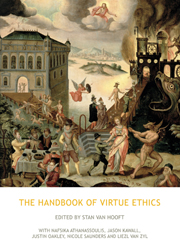Book contents
- Frontmatter
- Contents
- Acknowledgements
- 1 Introduction
- PART I NORMATIVE THEORY
- PART II TYPES OF VIRTUES
- 14 What virtues are there?
- 15 Intellectual virtues
- 16 Virtue, reason and wisdom
- 17 Integrity
- 18 The ends of courage
- 19 Wit
- 20 Humility, Kantian style
- 21 Love, sex and relationships
- 22 Forgiveness and forgivingness
- 23 The virtue of justice revisited
- 24 The virtues of African ethics
- 25 Classical Confucianism as virtue ethics
- 26 Ethics and virtue in classical Indian thinking
- 27 Mindfulness, non-attachment and other Buddhist virtues
- 28 Virtue in Islam
- PART III APPLIED ETHICS
- PART IV THE PSYCHOLOGY OF VIRTUE
- Contributors
- References
- Index
20 - Humility, Kantian style
from PART II - TYPES OF VIRTUES
- Frontmatter
- Contents
- Acknowledgements
- 1 Introduction
- PART I NORMATIVE THEORY
- PART II TYPES OF VIRTUES
- 14 What virtues are there?
- 15 Intellectual virtues
- 16 Virtue, reason and wisdom
- 17 Integrity
- 18 The ends of courage
- 19 Wit
- 20 Humility, Kantian style
- 21 Love, sex and relationships
- 22 Forgiveness and forgivingness
- 23 The virtue of justice revisited
- 24 The virtues of African ethics
- 25 Classical Confucianism as virtue ethics
- 26 Ethics and virtue in classical Indian thinking
- 27 Mindfulness, non-attachment and other Buddhist virtues
- 28 Virtue in Islam
- PART III APPLIED ETHICS
- PART IV THE PSYCHOLOGY OF VIRTUE
- Contributors
- References
- Index
Summary
Had [George Washington] been merely humble, he would probably have shrunk back irresolute, afraid of trusting to himself the direction of an enterprise, on which so much depended.
Mary Wollstonecraft (1996: 124)|[H]umility … and the whole train of the monkish virtues; for what reason are they everywhere rejected by men of sense, but because they serve to no manner of purpose …? We justly, therefore, transfer them to the opposite column, and place them in the catalogue of vices.
David Hume (1994: 219, 270)WOLLSTONECRAFT AND HUME ON HUMILITY
The eighteenth century is a good place to look to appreciate the challenges one faces in trying to define humility as a virtue. For eighteenth-century figures like Wollstonecraft and Hume, humility is perceived more as a liability, a weakness – even a vice – than as a virtue. And the reasons Wollstonecraft and Hume give for their rejections of humility are not mere isolated and idiosyncratic opinions; they are, rather, not only paradigmatic of their age, but paradigmatic of the challenges that any age faces in trying to make sense of a virtue related to appreciating one's limitations.
For Wollstonecraft, humility entails a belief in one's own weakness, one that would preclude a person holding it from engaging in any decisive action. The humble person is, according to her, “irresolute”: that is, indecisive, unable to trust herself, and thus incapable of great actions. If George Washington had been humble, America would never have been founded.
- Type
- Chapter
- Information
- The Handbook of Virtue Ethics , pp. 231 - 241Publisher: Acumen PublishingPrint publication year: 2013



